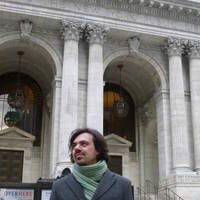
Ioanna Kralli
Ioanna Kralli studied Classical Philology at the University of Ioannina. She has a Master's degree in Classical Studies and a Doctorate in Ancient History (both at University College London; supervisor Prof. M.H. Crawford). She was awarded a postdoctoral fellowship from the State Scholarships Foundation and a visiting fellowship from Princeton University (for the "Program of Hellenic Studies").
She is currently assistant professor at the History Dept., Ionian University (Corfu, Greece); she also taught at the Universities of Crete, Patras, and the Hellenic Open University.
She has published articles on the political relations of Athens with the kings during the Hellenistic period, as they emerge mainly from epigraphical testimonia, on the continuity and change(s) of Athenian political and military practices, as well as on the political exploitation of the Panhellenic Games by the Hellenistic kings.
Her monograph The Hellenistic Peloponnese: Interstate Relations. A Narrative and Analytic History, from the Fourth Century to 146 BC, was published in 2017.
She has been the Director of the Classical Press of Wales since June 2020
Supervisors: Prof. M.H. Crawford
She is currently assistant professor at the History Dept., Ionian University (Corfu, Greece); she also taught at the Universities of Crete, Patras, and the Hellenic Open University.
She has published articles on the political relations of Athens with the kings during the Hellenistic period, as they emerge mainly from epigraphical testimonia, on the continuity and change(s) of Athenian political and military practices, as well as on the political exploitation of the Panhellenic Games by the Hellenistic kings.
Her monograph The Hellenistic Peloponnese: Interstate Relations. A Narrative and Analytic History, from the Fourth Century to 146 BC, was published in 2017.
She has been the Director of the Classical Press of Wales since June 2020
Supervisors: Prof. M.H. Crawford
less
Related Authors
Michele Faraguna
Università degli Studi di Milano - State University of Milan (Italy)
Mirko Canevaro
University of Edinburgh
Edward Harris
University of Edinburgh
Ilias N Arnaoutoglou
Academy of Athens
Sven Guenther
Northeast Normal University
Kieran McGroarty
National University of Ireland, Maynooth
James Sickinger
Florida State University
Paul A Iversen
Case Western Reserve University
Stefano Ferrucci
University of Siena / Università di Siena
alberto maffi
Università di Milano-Bicocca
InterestsView All (7)









Uploads
Papers by Ioanna Kralli
early Hellenistic period, that is after the battle of Chaironeia in 338 B.C. and until the late 260s.
For Athens this was a transitional period; she had to face a completely new political reality: she was no longer the great power of the fifth or even the fourth century B.C., Macedonia rose to power, then Alexander created a huge empire and his death triggered endless struggles for power among his Successors, in which Athens found herself involved.
Independent foreign policy then on the part of Athens was impossible; on the other hand, diplomacy became more delicate and demanding than ever. I focus on the ways in which the Athenian leadership (the generals and the orators) adjusted to the circumstances.
Firstly, I have examined the role of the generals in diplomacy in order to
establish that they did assume increased responsibilities. Secondly, I have examined the role of the orators in the formation of relations with the various monarchs, in an attempt to trace the changes that Athenian diplomacy underwent. Finally, I have dealt with an important aspect of the orators’ career and an important instrument in diplomacy: the
passing of honours for kings and their officials as well as for Athenian citizens. My purpose was to establish the ways in which euergesia (benefaction) was affected by the circumstances as well as the influence it exercised on foreign relations.
The aim of my thesis is to demonstrate that the Athenian political system did survive in this period; Athens proved to be quite flexible, capable of responding to the new situation; whatever changes were made, they were due to practical considerations, without affecting the substance of the system.